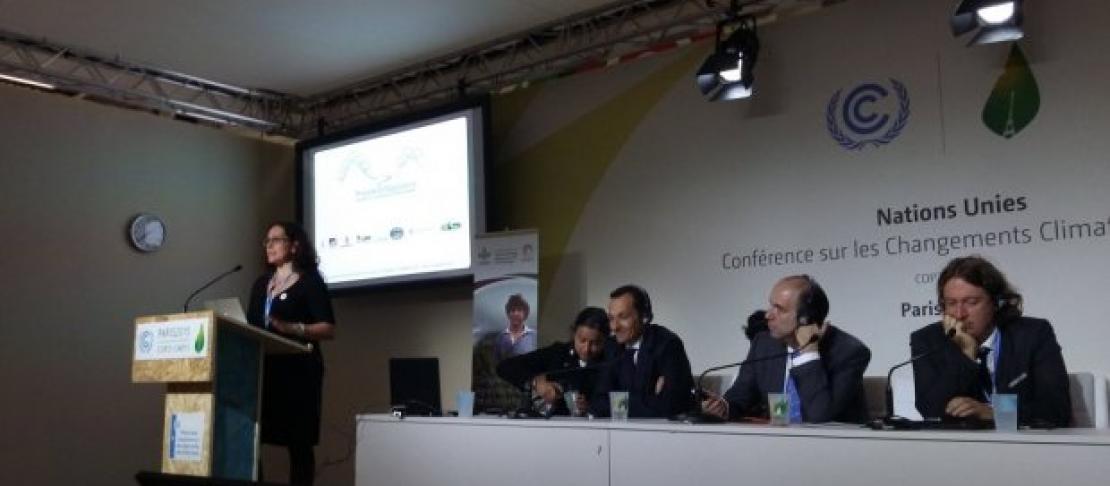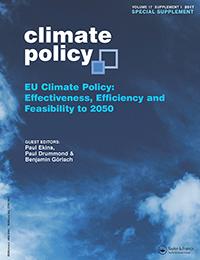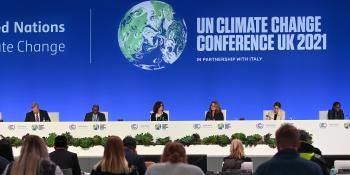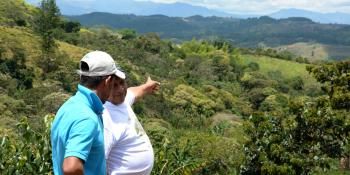Informing climate policy through institutional collaboration

Make scientific findings move from research centers to inform public policy is a more difficult process than one may think; but when achieved, policies not only have more support, but the results are much stronger.
An example of this is the NDC building process that the Government of Colombia presented at the climate summit and with which it subscribed to the Paris Agreement. This process is addressed as a case study in a recent article published in the journal Climate Policy, which, like the same process it describes, was developed jointly between CCAFS, research centers and government institutions.
This publication describes the interactive process behind how policy-oriented research (POR) was instrumental in building the Colombian NDC, the institutional arrangements required for the process, and lessons learned. As a result, the NDC submitted in Paris offered realistic but ambitious scenarios about the Colombian government's mitigation commitment.
Policy-oriented and interactive research
The European Union states that public policies should, wherever possible, be grounded in the best evidence available. However, achieving this depends on a multiplicity of factors that the authors of the article emphasize as issues that cannot be underestimated: inducing policy change is highly complex and does not proceed in a linear or rational fashion.
 Factors such as pre-existing interests, institutional relationships, and the nature of the policy-making processes in the countries, are part of the complexities mentioned by the authors to translate the scientific findings into public policies. While there is a growing consensus about the urgency of involving stakeholders in the process of scientific production (known as collaborative research), the authors also consider criticisms to this process, such as restricting scientific ambitions due to the prioritization of short-term practical solutions, as well as questionings to the neutrality of the results and the freedom in the definition of research agendas.
Factors such as pre-existing interests, institutional relationships, and the nature of the policy-making processes in the countries, are part of the complexities mentioned by the authors to translate the scientific findings into public policies. While there is a growing consensus about the urgency of involving stakeholders in the process of scientific production (known as collaborative research), the authors also consider criticisms to this process, such as restricting scientific ambitions due to the prioritization of short-term practical solutions, as well as questionings to the neutrality of the results and the freedom in the definition of research agendas.
In Latin America, interesting examples of policy-oriented research have been presented, and the authors mention cases from Uruguay, Brazil, Mexico, and Ecuador addressed in a study aimed at promoting the debate around how to strengthen the links between research and policies. The authors also mention evidence of the participatory elaboration of the NDCs in Mexico, Chile and Costa Rica, although they clarify that the literature on this issue is scarce.
How did it become possible?
The article describes that to understand the process that led Colombia to build its NDC, we need to go back to 2010, when the Ministry of Environment participated in the Mitigation Action Plans and Scenarios program (MAPS). Thanks to this, the Ministry consolidated the Colombian Low Carbon Development Strategy (ECDBC in Spanish), with a portfolio of more than 90 mitigation actions. Another result of the program was the beginning of a dynamic and trustful conversation with the University of Los Andes in order to formulate the NDC.
The Strategy was supported by other government agencies and representatives from the sectors that are considered to contribute the most to national greenhouse gas (GHG) emissions, and ratified the need to have a very robust technical component when formulating mitigation policies. In this regard, while the Ministry received high-quality support from academia, it did not have the capacity to model with a high level of confidence the emissions from agriculture, forestry and other land uses (AFOLU).
The CGIAR Research Program on Climate Change, Agriculture and Food Security (CCAFS) had engaged with the Government of Colombia since 2013, and was perceived as an ideal information broker among institutions. This is why, in order to help solve the capacities issue, CCAFS promoted an alliance between the University of Los Andes and the International Institute for Food Policy Research (IFPRI) to generate reliable mitigation scenarios for the AFOLU sector. IFPRI's contribution was based on its ability to develop highly disaggregated analyzes of low-emission development strategies, which was a perfect complement to the capabilities of the University of Los Andes.
The result of this collaboration between research, government and the private sector allowed to develop more robust mitigation scenarios, and greater confidence in results, which resulted in an unconditional emission reduction target of 20% plus 10% conditioned to international support. Learn more: Colombia's agriculture in the Intended Nationally Determined Contribution spotlight
Conclusions and lessons learned
The journal article highlights four key elements for the success of policy-oriented research: a sustained and open consultation process with all stakeholders; usable science and willingness to break disciplinary and institutional barriers; identify a champion (institutional or personal) for the project; and flexibility in the availability of resources.
In addition to the country's ambitious mitigation goal, the authors point out that the NDC's collaborative construction process provides an opportunity to the country to be at the forefront of the debate on climate change, and is also an opportunity to form a new generation of scientists with a new skill set, and decision makers with a renewed commitment to sustainable growth, promoting consistent ideas to formulate new and better public policies.
Read the article: Informing climate policy through institutional collaboration: reflections on the preparation of Colombia’s nationally determined contribution
José Luis Urrea is communications officer for CCAFS Latin America. With contributions from Ana María Loboguerrero, CCAFS Latin America Regional Program Leader.



